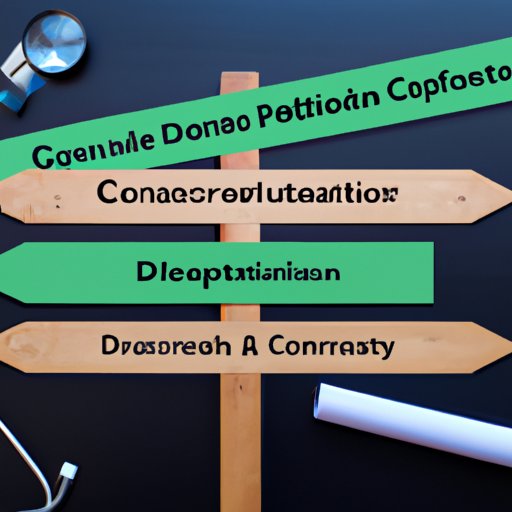Introduction
A Communication Sciences and Disorders (CSD) degree is an interdisciplinary field of study that focuses on communication and speech-language pathology. It provides students with the knowledge and skills needed to work in a variety of settings, including schools, hospitals, nursing homes, and private practices. CSD degrees offer a range of career paths that can be tailored to each individual’s interests and goals. This article will explore the various job prospects, specializations, and other opportunities available to those with a Communication Sciences and Disorders degree.

Job Prospects and Career Paths with a Communication Sciences and Disorders Degree
Those with a Communication Sciences and Disorders degree have a wide variety of job prospects and career paths to choose from. Speech-language pathology is one of the most common career paths for those with a CSD degree. Speech-language pathologists help individuals with communication disorders, such as stuttering, autism spectrum disorder, and apraxia of speech. They assess, diagnose, and treat these disorders, often working with patients both in individual and group settings. Other jobs in the field include audiologists, who specialize in diagnosing and treating hearing impairments, and researchers, who study communication disorders and create new treatments.
In order to work in the field of Communication Sciences and Disorders, individuals must first earn a master’s degree in the subject. Most states also require professionals to obtain licensure or certification in order to practice. Additionally, many employers prefer candidates to have experience working in the field. Those who are interested in pursuing a career in CSD should look for volunteer and internship opportunities in order to gain knowledge and experience in the field.

Exploring the Different Specializations within a Communication Sciences and Disorders Degree
In addition to the traditional career paths associated with a Communication Sciences and Disorders degree, there are a number of specializations available. These include Voice and Resonance, Speech Language Pathology, Neurogenic Communication Disorders, Augmentative and Alternative Communication, Fluency, and Pediatric Audiology. Each specialization has its own set of courses and requirements. For example, those specializing in Voice and Resonance will take courses in vocal anatomy and physiology, acoustics, and voice therapy, while those specializing in Neurogenic Communication Disorders will take courses in neuroanatomy and neurophysiology.
Pursuing a specialization can be beneficial for those looking to advance their careers. It gives them the opportunity to become an expert in a specific area of the field, making them more attractive to potential employers. It can also lead to higher salaries and better job opportunities. According to a study by the American Speech-Language-Hearing Association, “specialists in the field of communication sciences and disorders who hold specialty certifications earn an average of 15% more than those without certification.”
Strategies for Finding the Right Graduate Program in Communication Sciences and Disorders
Finding the right graduate program can be a daunting task. There are a number of factors to consider when researching programs, such as cost, location, faculty, and curriculum. It’s important to research different programs and compare them side-by-side in order to make an informed decision. When researching programs, it’s also important to look at program outcomes and accreditation. Accredited programs have met certain standards set by professional organizations, ensuring they provide students with a quality education.
It’s also important to look into any financial aid options available. Many programs offer scholarships and grants to help offset the cost of tuition. Additionally, some programs may offer loan forgiveness programs or other forms of assistance. Students should also research any internships or externships available through the program, as these can be great ways to gain experience and build connections in the field.
Tips for Successfully Navigating Your Studies in Communication Sciences and Disorders
Navigating studies in Communication Sciences and Disorders can be challenging, but there are several strategies that can help. It’s important to prepare for classes by reading the assigned material and attending lectures. Additionally, developing good time management skills is essential for success. Students should create a schedule that allows them to manage their workload and still have time for leisure activities. Additionally, taking advantage of tutoring services or study groups can be helpful for mastering difficult concepts.

How to Use Your Communication Sciences and Disorders Degree to Make an Impact in Your Community
Having a Communication Sciences and Disorders degree can open up a number of opportunities to make an impact in your community. One way to do this is by volunteering. There are a number of organizations that offer volunteer opportunities for those with a CSD degree, such as speech-language therapy clinics, public schools, and hospitals. Volunteering can be a great way to gain experience and help those in need.
Another way to make an impact in your community is by pursuing leadership roles. Many organizations are always looking for qualified professionals to fill leadership roles. These positions can involve teaching classes, leading research projects, and advocating for change. Pursuing a leadership role can be a great way to gain experience and make a difference in your community.
The Benefits of Pursuing a Professional Certification in Communication Sciences and Disorders
For those looking to further their careers in Communication Sciences and Disorders, obtaining a professional certification can be beneficial. Professional certifications demonstrate a level of expertise in the field and can open up new job opportunities. The American Speech-Language-Hearing Association offers a number of certifications, such as the Certificate of Clinical Competence in Speech-Language Pathology and the Certificate of Clinical Competence in Audiology. Obtaining a professional certification can also lead to higher salaries and increased credibility with colleagues and employers.
Conclusion
A Communication Sciences and Disorders degree opens up a world of possibilities. Those with a CSD degree have a range of job prospects and career paths to choose from, as well as a variety of specializations and graduate programs. In order to be successful in the field, students must develop strong time management skills and take advantage of volunteer and internship opportunities. Additionally, obtaining a professional certification can be beneficial for advancing one’s career. With the right preparation and dedication, those with a Communication Sciences and Disorders degree can make a positive impact in their communities and beyond.
(Note: Is this article not meeting your expectations? Do you have knowledge or insights to share? Unlock new opportunities and expand your reach by joining our authors team. Click Registration to join us and share your expertise with our readers.)
